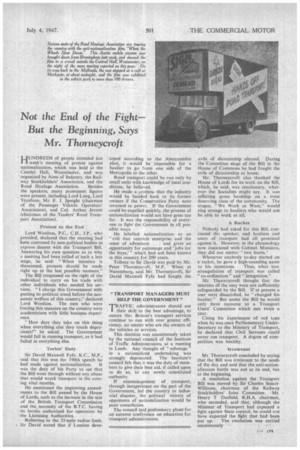Not the End of the Fight— But the Beginning, Says
Page 25

If you've noticed an error in this article please click here to report it so we can fix it.
Mr. Thorneycroft
HUNDREDS of people attended last week's meeting of protest against nationalization, which was held at the Central Hall, Westminster, and was 'organized by Aims of Industry, the Rail:. way Stockholders' Association, and the
Road Haulage Association. Besides the speakers, many prominent figures , were present, including Lord Long, Lord Tey-nham, Mr. F. J. Speight (chairman of the Passenger Vehicle Operators' Association), and Col. Arthur Jerrett (chairman of the Traders' Road Transport Association).
Protest to the End Lord Woolton, P.C., C.H., LP., who presided, declared that the meeting had been convened by non-political bodies to express dissent with the Transport Bill. Answering his own question as to why a meeting had been called afsuch a late stage, he said: "When injustice is threatened, protests should be made right up to the last possible moment."
The Bill trespassed on the right of the individual to carry on his trade with other individuals who needed his services. "I charge this Government with putting its political creed before the economic welfare of this country," declared Lord Woolton. The men who were forcing this measure on the country were academicians with little business experience.
"How dare they take on this thing when everything else they touch depreciates?" he asked. The Government would fail in running transport, as it had failed in everything else.
Tories' Duty • Sir David Maxwell Fyfe, K.C., M.P., said that this was the 190th speech he had made against nationalization. It was the duty of his Party to see that the Bill went through without any abuse that would wreck transport in the coming vital months.
He mentioned the improving amendments to the Bill passed by the House of Lords, such as the increase in the size of the British Transport Commission and the necessity of the B.T.C. having its lorries authorized for operation by
the Licensing Authorities. • ,Referring to the 25-mile 'radius limit, Sir David stated that if London deve loped according to the Abercrombie plan, it would be impossible for a haulier to go from One side of the Metropolis to the other.
Road transport could be run only by small units with knowledge of local conditions, he believed.
He made a From* that the industry would be handed back to its former owners if the Conservative Party were returned to power. If the Government could be expelled quickly, the process of nationalization would not have gone too far. It was the responsibility of everyone to fight the Government in all possible ways.
He labelled nationalization as an "evil that restricts enterprise •and the sense of adventure . . and gives an opportunity for patronage and 'jobs for the boys,'" which had not been known in this country for 200 years.
Tribute to Sir David was paid by Mr. Peter Thorneycroft, M.P. When at Nuremburg, said Mr. Thorneycroft, Sir David Maxwell Fyfe had fought the "TRANSPORT MANAGERS MUST HELP THE GOVERNMENT" TRAFFIC administrators should use I their skill to the best advantage, to ensure that Britain's transport services continue to run with ever greater efficiency, nb matter who are the owners of the vehicles or services.
This decision was unanimously taken by the national council of the Institute of Traffic Administrators, at a meeting in Leeds. Any thought of " sabotage " in a nationalized undertaking was strongly deprecated. The Institute's council felt that it was the duty of members to give their best aid, if called upon to do so, to any newly constituted. authority.
If mismanagement of transport, through inexperience on the part of the Government, led the country to industrial disaster, the political victory of opponents of nationalization would be poor consolation.
The council laid preliminary planS. for an autumn conference on education for transport 'adininistrators.
evils of dictatorship abroad. During the Committee stage of the Bill in the House of Commons he had fought the evils of dictatorship at home, Mr. Thorneycroft also thanked the House of Lords for its work on the Bill, which, he said, was reactionary, whatever the Socialists might say. It was inflicting gross hardship on a most deserving class of the community. The slogan, "We Work or Want," would ring strange to hauliers who would not be able to work at all.
. A Racket Nobody had asked for this Bill, continued the speaker, and hauliers and users of transport had all protested against it. However, in the phraseology now associated with Cabinet Ministers, they did not 'matter "two hoots.'
Whenever anybody to-day started on a racket, he gave a high-sounding name to his intentions. Thus, what was strangulation of transport was called " co-ordination " and "integration.'
Mr. Thorneycroft thought that the interests of the user were not sufficiently safeguarded by the Bill. If at present a user were dissatisfied, he "changed his haulier." But under the Bill he would only have recourse to a Transport Users' Committee which met twice a year.
Citing his experiences of red tape when he was once Parliamentary UnderSecretary to the Ministry of Transport, he declared that Civil Servants could never run transport. A degree of competition was healthy.
Irrelevant Mr, Thorneycroft concluded by saying that the Bill was irrelevant to the needs of the day and said that the anti-nationalization battle was not at its end, but at the beginning.
A resolution against the Transport Bill was moved by Sir Charles StuartWilliams, chairman of the Railway Stockholders' Joint Committee. Mr. Henry T Outfield, R.H.A. chairman, who seconded, said that, although the Minister of Transport had expected a fight against .State control, he could not have expected the fiiht that had been put up. The resolution was carried unanimously












































































